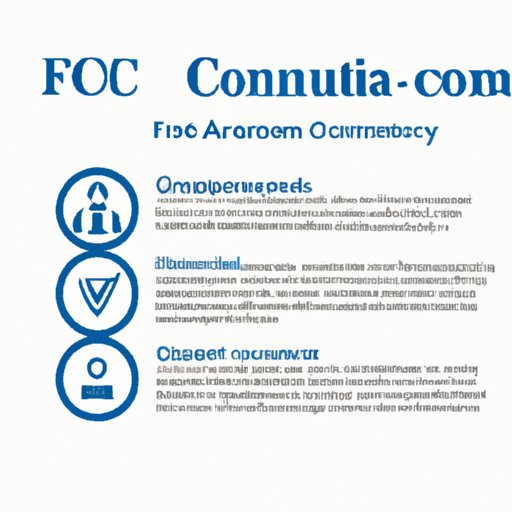Introduction
The Financial Conduct Authority (FCA) is a regulatory body that was established in 2013 to protect consumers, regulate financial services and markets, and supervise financial institutions. This article will provide an overview of the FCA, discuss its history, and explore its role in protecting consumers, regulating markets, and enforcing principles for businesses.

A History of the Financial Conduct Authority
The FCA was created in 2013 following the dissolution of the Financial Services Authority (FSA), which had been the primary regulator of financial services in the United Kingdom since 1997. The FSA had become increasingly unpopular with the public due to its failure to prevent the 2008 financial crisis, leading to the creation of the FCA as a replacement.
The FCA was established with the goal of restoring trust in the financial services industry by creating a more effective regulatory framework. The FCA has sought to make the financial services industry more transparent, accountable, and accessible to all consumers.
The Role of the Financial Conduct Authority
The FCA is responsible for protecting consumers, regulating financial services and markets, and supervising financial institutions. The FCA works to ensure that financial services are fair and accessible for all consumers, regardless of their personal circumstances.
The FCA has the power to investigate any potential breaches of the rules and regulations governing the financial services industry. It can also impose fines on companies or individuals who are found to be in breach of these rules. In addition, the FCA has the power to revoke a company’s license if it fails to comply with the regulations.
Protecting Consumers
The FCA is responsible for ensuring that financial services are being provided in a fair and transparent manner. It sets out a range of rules and guidance to ensure that firms are providing customers with clear information about their products and services. The FCA also works to protect consumers from unfair practices, such as mis-selling, aggressive sales tactics, and inappropriate advice.
Regulating Financial Services and Markets
The FCA is responsible for regulating the financial services industry, including banks, insurance companies, investment firms, and stockbrokers. It sets out rules and guidance to ensure that firms are operating in a safe and responsible manner. The FCA also monitors the markets to identify any potential risks to consumers or investors.
Supervising Financial Institutions
The FCA is responsible for supervising financial institutions to ensure that they are complying with the rules and regulations. The FCA has the power to investigate any potential misconduct and take action against firms that are not complying with the rules. The FCA also works to ensure that firms are working in the best interests of their customers.

Benefits of Being Regulated by the Financial Conduct Authority
Being regulated by the FCA brings many benefits to both consumers and firms. Research conducted by the FCA has shown that firms that are regulated by the FCA are more likely to provide better quality products and services than those that are not regulated.
For consumers, being regulated by the FCA means that they have increased protection from unfair practices and can be confident that their investments are being managed in a safe and responsible manner. In addition, regulated firms must adhere to higher standards of customer service, meaning that consumers can expect a higher level of service from regulated firms.
For firms, being regulated by the FCA means that they can benefit from increased transparency and improved reputation. This can lead to increased customer trust and loyalty, as well as improved profitability.

Understanding the Regulatory Framework of the Financial Conduct Authority
The FCA operates under a set of principles for businesses, which aims to ensure that firms are providing customers with clear and accurate information. These principles include: acting with integrity, treating customers fairly, managing conflicts of interest, and having appropriate governance arrangements.
In addition, the FCA has set out a range of rules and guidance that firms must adhere to. These rules and guidance cover areas such as product disclosure, marketing, and customer complaints. The FCA also has the power to enforce these rules, meaning that firms that do not comply can face penalties.
Finally, the FCA has a range of enforcement powers that it can use to ensure that firms comply with the rules and regulations. These powers include the ability to issue warnings, suspend or cancel licenses, and impose fines.
Conclusion
The Financial Conduct Authority plays an important role in protecting consumers, regulating financial services and markets, and supervising financial institutions. By ensuring that firms are operating in a fair and transparent manner, the FCA helps to increase confidence in the financial services industry and improve the quality of service for consumers.
(Note: Is this article not meeting your expectations? Do you have knowledge or insights to share? Unlock new opportunities and expand your reach by joining our authors team. Click Registration to join us and share your expertise with our readers.)
